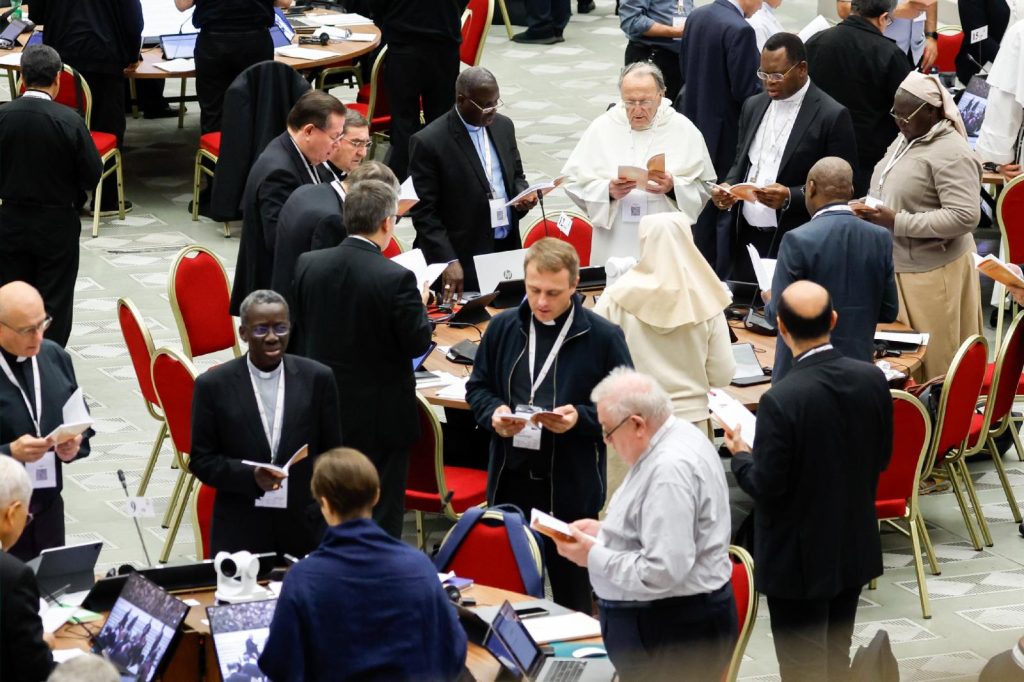
VATICAN CITY. Greater synodality can help the Catholic Church in safeguarding minors because people, especially children, need to be able to speak up and to do so without fear, said a participant in the synod on synodality.
“I think that being a synodal church is going to be one of the best ways to help” with the issue of the safeguarding of minors “because at the basis of abuse of children is also the fact that children are afraid to speak,” said Nora Kofognotera Nonterah at a synod briefing Oct. 25.
Synodality must start in the family, “where Christian families practice listening in a way that children can be free to first of all speak freely” to their parents, siblings and relatives, she said in response to a question about how safeguarding might benefit from a more synodal approach in the Church.
“That is going to be one of the best ways that synodality can help us in the safeguarding of minors because people need to speak,” said Nonterah, a theologian, expert in peace-building and interreligious dialogue, and a lecturer in religious studies at Kwame Nkrumah University of Science & Technology in Kumasi, Ghana.
The Pontifical Commission for the Protection of Minors had asked synod members to make time for “substantial discussion” of abuse and safeguarding during the assembly.
Cardinal Robert Prevost, prefect of the Dicastery for Bishops, said the “protection of minors was discussed at some tables, I understand, more than at others, perhaps.”
For synod members, he said, “it was an issue in the sense of saying what are some of the problems that may arise and how can we better address them, but that was not meant to be the central topic of the synod.”
Synod members at the press briefing also were asked what has and has not worked with the synodal process, which began in 2021 and included listening sessions at the local, regional, national and continental levels, and what could be done to make it more successful as it approaches its conclusion in 2024.
Archbishop Timothy P. Broglio, head of the U.S. Archdiocese for the Military Services and president of the U.S. bishops’ conference, said that “in the two years leading up to the synod, less than 1 percent of the Catholics throughout the world participated.”
One thing to do, he said, “is to encourage greater participation and invite people to partake and really engage in this process of speaking and listening and praying together” as well as “find ways to draw more people into the participation.”
A reporter asked a follow-up question about whether the U.S. bishops could have done more to ensure greater participation.
“That’s a good question. I’m sure that we do have some responsibility for it. We did discuss the synod at the June meeting, but it was in executive session,” whose agenda is not made public, the archbishop said.
Members of the assembly were scheduled to discuss how to use the interim period between now and the next session in October 2024 “to generate interest and also to share what the experience has brought about,” he said.
So, when the U.S. bishops meet for their fall plenary assembly in November, he said, “we’ll talk about the experience of the synod, and we’ll also talk about ways going forward” and to encourage more participation.
Efforts will “have to be very capillary,” the archbishop said. “The diocesan bishops can do a number of things, but if the parish priests aren’t on board, it won’t go beyond the chancery. And so that’s certainly something we have to do is engage the priests so that they will then engage their people.”
In her initial presentation to the press, Nonterah said she felt encouraged and inspired by the Oct. 4-29 synod. “I felt listened to as a layperson, as a woman and an African in a church that most often has not given that voice, has not had a chance to enrich herself with the voice and wisdom from women, from laypeople and from Africans.”
“I have become so convinced in these days that a synodal church must be willing to sit at the foot of women, especially laywomen who are from the Global South, to learn how to renew the Church’s imagination, an imagination oriented to the Holy Spirit who mediates abundance of life for all,” she said.
“Inspired by the significance of the maternal role of our lady, Mother Mary, I tend to believe that African women can teach the church how to be a mother for all, how to be a visionary mother for all her children,” she added.
A more synodal church, she said, “can only be possible if we have true and authentic and deep formation that is rooted in conversation in the Spirit who always invites us to celebrate our differences, not to hide them, but to recognize and celebrate them.”









